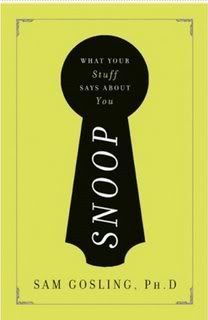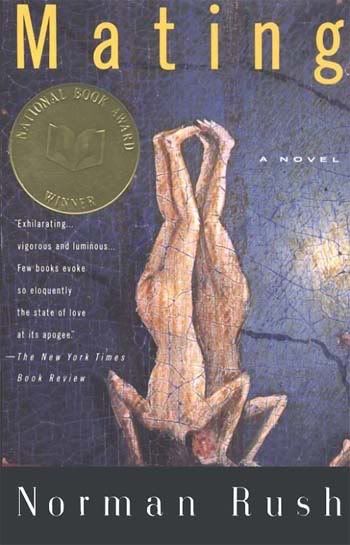Stanley Kubrick said it was a monolith
I started writing a big ol' post a few months ago about eugenics as the next evolutionary step, but I either opted not to publish it or didn't finish it, and haven't thought much about it since.
Well, that is, until tonight, when I happened to catch an episode of Naked Science on the National Geographic Channel. The episode I caught is called "Spaceman," and it raised a lot of the questions I've been mulling about the future of the human race, only the episode's basic hypothesis is, "What do we need to do to endure major, long-term space travel, which is potentially inevitable when/if Earth becomes uninhabitable?"
Scientists say that gestation of a human fetus in space is a precarious proposition, because gravity is thought to be an essential part of normal fetal development. It's too dangerous to stick a pregnant lady up in a space shuttle, so they have experimented with bird eggs (they never hatched) and pregnant mice (when the two-day old mice were brought back to Earth and submerged in water, they had no internal sense of up or down, unlike baby mice born on Earth, so they just languished upside-down underwater with no sense of balance, whereas the Earth-born mice flipped themselves over to float right-side up). Fascinating.
I was pleasantly surprised to see a couple of women scientists busting out with some revolutionary findings, since the sciences are notoriously male-dominated. One woman is designing the next generation of form-fitting spacesuits so astronauts don't have to look and move like the Stay Puff Marshmallow Man, and another has isolated the aging gene in worms that, once switched off, allows the worms to live six times as long — and remain active the whole time. If we could locate a similar gene in humans and switch it off, that would translate into humans living for 500 years or so, and being active almost the entire time. The worm lady also found a hibernation gene in these worms that allows them to sleep in a state of suspended animation for long periods of time, and she's hunting for a similar gene in people.
Where eugenics comes in is like so: Theoretically, if we could cherry-pick genetic traits from different animals that will help us endure long-term space travel and implant those genes into fetus space-travelers, we would be able to withstand the rigors of deep space. We could take a high resistance to radiation from cockroaches, the anti-aging and hibernation genes from those worms, another gene for stronger bones and muscles, etc., and create a human more adaptable to space travel. It's the next evolutionary leap.
They've have already shown that they can implant genes from one animal into another. They showed video of mice babies that were born with the glow gene from a fluorescent jellyfish, and those little shits were glowing green!
I'm all for it. Seriously. Not some weird Island of Dr. Moreau shit like glowing mice or people with gills, of course, but controlled genetic modifications that will enable us to evolve past life on this earth, if need be. It's weird — I don't really think of it as playing God if it means survival of the species. (And, really, what'e wrong with playing God? I do it all the time with my Sims and they seem to be so happy that they dream about recycling and dollar signs.) If the earth will indeed be stripped of its resources, or if nature becomes too violent for people to inhabit the planet, why shouldn't we use science as a tool by which we can ensure that human life will continue somewhere?
Is that crazy? It kind of makes me feel crazy for thinking that it's a cool possibility, but think about it. The religious nuts are the ones whose motto is This world is not my home. So they hope for it too, albeit in a different way. They want to attain life through death; I'd like to see us attain life through life and then, when that gets boring, we'll check out death and see what's up with that. I just want to know what's out there and why space is so vast and scary. What it's hiding. That's all. And, really, I don't want to find out myself. I'd rather just some scientist find out and then let National Geographic make a documentary about it that I might catch accidentally one night after work. Is that so much to ask, people?
Well, that is, until tonight, when I happened to catch an episode of Naked Science on the National Geographic Channel. The episode I caught is called "Spaceman," and it raised a lot of the questions I've been mulling about the future of the human race, only the episode's basic hypothesis is, "What do we need to do to endure major, long-term space travel, which is potentially inevitable when/if Earth becomes uninhabitable?"
Scientists say that gestation of a human fetus in space is a precarious proposition, because gravity is thought to be an essential part of normal fetal development. It's too dangerous to stick a pregnant lady up in a space shuttle, so they have experimented with bird eggs (they never hatched) and pregnant mice (when the two-day old mice were brought back to Earth and submerged in water, they had no internal sense of up or down, unlike baby mice born on Earth, so they just languished upside-down underwater with no sense of balance, whereas the Earth-born mice flipped themselves over to float right-side up). Fascinating.
I was pleasantly surprised to see a couple of women scientists busting out with some revolutionary findings, since the sciences are notoriously male-dominated. One woman is designing the next generation of form-fitting spacesuits so astronauts don't have to look and move like the Stay Puff Marshmallow Man, and another has isolated the aging gene in worms that, once switched off, allows the worms to live six times as long — and remain active the whole time. If we could locate a similar gene in humans and switch it off, that would translate into humans living for 500 years or so, and being active almost the entire time. The worm lady also found a hibernation gene in these worms that allows them to sleep in a state of suspended animation for long periods of time, and she's hunting for a similar gene in people.
Where eugenics comes in is like so: Theoretically, if we could cherry-pick genetic traits from different animals that will help us endure long-term space travel and implant those genes into fetus space-travelers, we would be able to withstand the rigors of deep space. We could take a high resistance to radiation from cockroaches, the anti-aging and hibernation genes from those worms, another gene for stronger bones and muscles, etc., and create a human more adaptable to space travel. It's the next evolutionary leap.
They've have already shown that they can implant genes from one animal into another. They showed video of mice babies that were born with the glow gene from a fluorescent jellyfish, and those little shits were glowing green!
I'm all for it. Seriously. Not some weird Island of Dr. Moreau shit like glowing mice or people with gills, of course, but controlled genetic modifications that will enable us to evolve past life on this earth, if need be. It's weird — I don't really think of it as playing God if it means survival of the species. (And, really, what'e wrong with playing God? I do it all the time with my Sims and they seem to be so happy that they dream about recycling and dollar signs.) If the earth will indeed be stripped of its resources, or if nature becomes too violent for people to inhabit the planet, why shouldn't we use science as a tool by which we can ensure that human life will continue somewhere?
Is that crazy? It kind of makes me feel crazy for thinking that it's a cool possibility, but think about it. The religious nuts are the ones whose motto is This world is not my home. So they hope for it too, albeit in a different way. They want to attain life through death; I'd like to see us attain life through life and then, when that gets boring, we'll check out death and see what's up with that. I just want to know what's out there and why space is so vast and scary. What it's hiding. That's all. And, really, I don't want to find out myself. I'd rather just some scientist find out and then let National Geographic make a documentary about it that I might catch accidentally one night after work. Is that so much to ask, people?




















1 Comments:
I can't imagine anything I would hate more than living for 500 years. Sometimes one day seems like more than I can handle.
As for the rest of all that, I'm all for it, too. I don't think we'll ever find out exactly what the hell (and where the hell) our universe is with respect to other universes and anything else that might be out there. I think that "reasons" are relative, and we're going to superimpose our own beliefs about our existence onto whatever scientific data we hear, anyway. But it is a fascinating field and deep space travel is an intriguing topic. Event Horizon is one of my favorite movies.
Post a Comment
<< Home